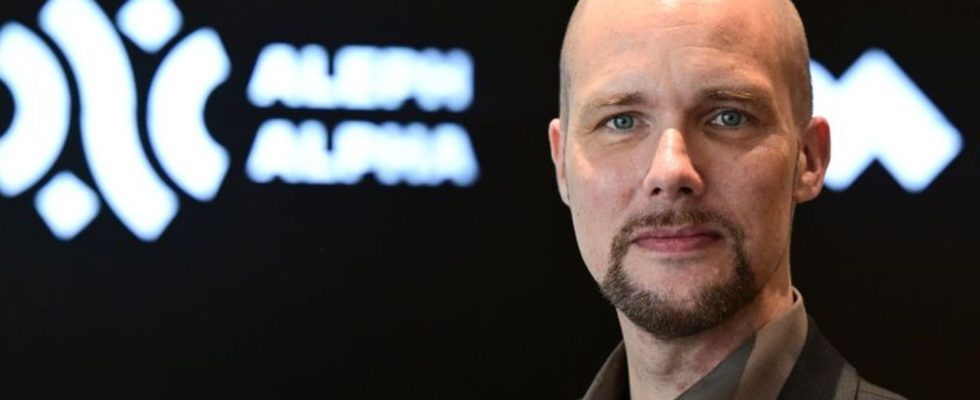financing round
Half a billion for AI start-up Aleph Alpha
Jonas Andrulis is the founder of the AI company Aleph Alpha. photo
© Bernd Weißbrod/dpa
Artificial intelligence fascinates users and investors. Three German companies and other donors are now investing a large sum of money to further develop a German AI company.
The German AI start-up Aleph Alpha has received a financial injection of more than half a billion US dollars (486 million euros). The The financing round is led by the venture capitalist Innovation Park Artificial Intelligence (IPAI), the Bosch Group and the trading and IT group Schwarz Group (Lidl, Kaufland).
Aleph Alpha announced this at the Baden-Württemberg state representation in Berlin. Europe’s largest software group SAP as well as investors Christ&Company and BurdaPrincipal Investments (BPI) are also on board for the second round of financing.
What does Aleph Alpha do?
Aleph Alpha develops large language models with artificial intelligence (AI) functions, similar to the Californian start-up OpenAI with ChatGPT. The Heidelberg-based company specializes in use cases for public administration and industry.
With the fresh money from investors, Aleph Alpha will be able to assert itself in competition with OpenAI, but also large corporations such as Microsoft and Google. A significant portion of the investment amount goes in the form of a capital commitment from IPAI, a project of the Dieter Schwarz Foundation, which wants to build Europe’s largest research center for artificial intelligence in Heilbronn.
Economics Minister Habeck is enthusiastic
Aleph Alpha is considered a model German start-up. Economics Minister Robert Habeck (Greens) spoke of an “insane success story”. The company, founded in 2019, succeeded last spring in reaching a milestone on the path to content-correct, explainable and trustworthy artificial intelligence.
An extension of the in-house language model Luminous is able to understand connections in information and factual correctness based on proven facts. Luminous, for example, forms the technical backbone of the city of Heidelberg’s Lumi citizen information system.
“With this latest investment, we will continue to expand our capabilities and enable our partners to be at the forefront of this technological evolution,” said Jonas Andrulis, CEO and founder of Aleph Alpha. In order to support customers, his company will continually expand its offering.
In sensitive areas of responsibility and in strategic environments for which sovereignty plays a central role, Aleph Alpha “will continue to be the best option,” Andrulis said. The company founder appealed to politicians not to overdo the upcoming regulation of AI. “We also need a few field players, not just referees.”
AI in Europe
Minister Habeck also warned against reducing the discussion about AI to the topic of security. At the British AI summit in Bletchley Park, the discussions about the possibilities were not given enough for his liking. Europe must now “really step on the gas” in order not to be left behind internationally.
“Wherever we are strong, AI made in Europe can also become strong,” said Habeck. Germany has its own expertise in sectors such as mechanical engineering, robotics and telecommunications. There is also enough data and expertise in these areas.
State Minister Florian Stegmann (Greens), head of the Stuttgart State Chancellery, pointed out that an AI ecosystem has developed in Baden-Württemberg. The “Cyber Valley” in the country has developed into the European magnet for machine learning.
“We have cutting-edge research, we have hubs, we have technology centers, we have the Innovation Park Artificial Intelligence (IPAI) in Heilbronn, which also plays a very important role today and we have a very active start-up scene: and from this Aleph Alpha was also created.”

